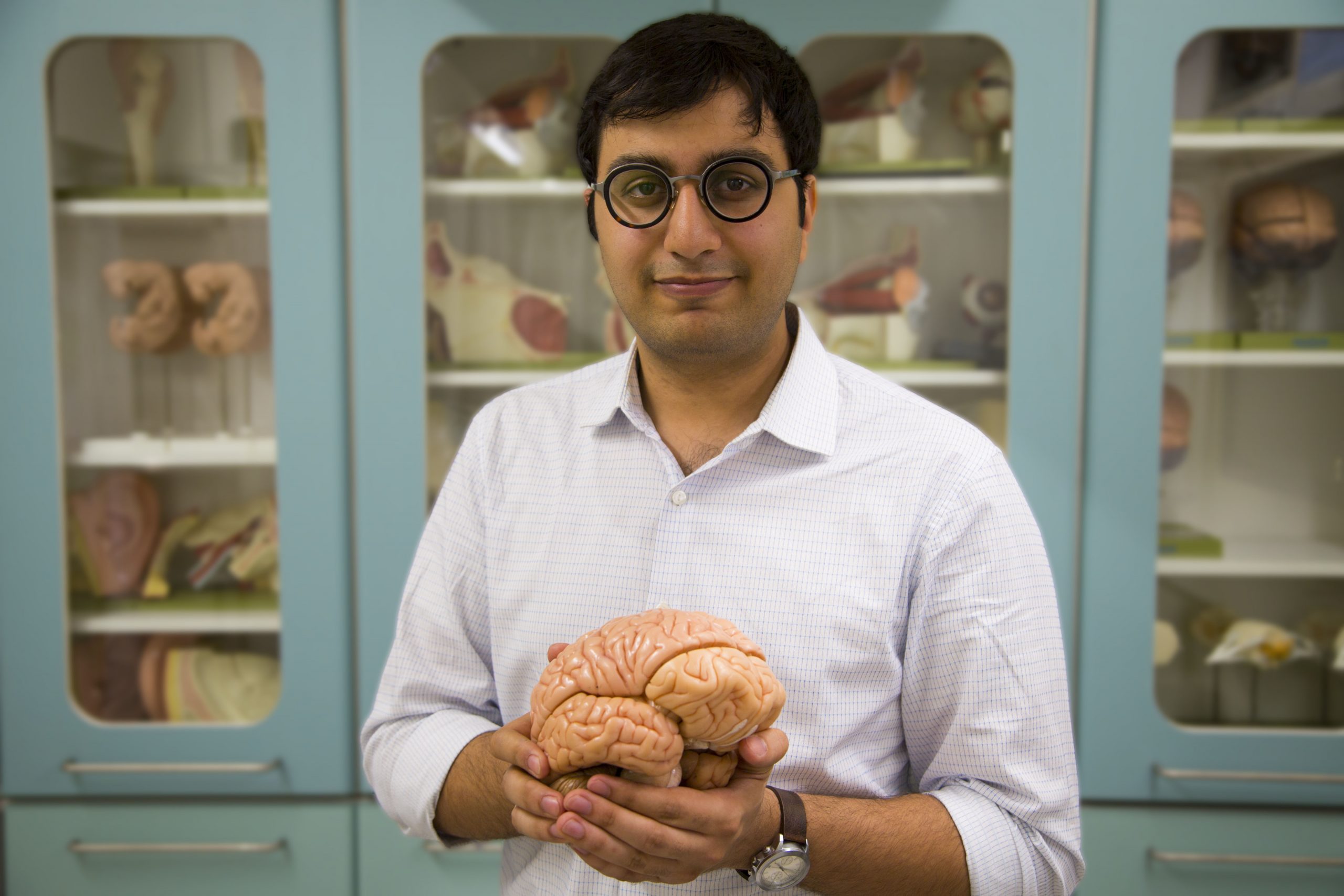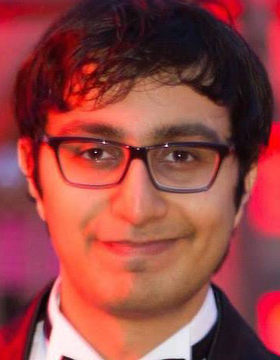
Scholar-Elect Minaam Abbas on his research on epitranscriptomics and his entrepreneurial activities.
My research is not just about learning core science and discovering something new, but how we can bring these discoveries from the lab bench to the patient's bedside.
Minaam Abbas
Minaam Abbas has not yet started his PhD, but he is already co-founder of two businesses which have the potential to transform how we fund business and how we treat cancer.
Minaam [2017], who will begin his PhD this autumn as a Gates Cambridge Scholar, is chief operating officer of angioClast, a company which aims to develop drugs that can target blood vessels of the most aggressive form of brain cancer.
He is also co-founder of Hazina, a social enterprise that aims to turn microfinance on its head by cutting out the middle man and providing an alternative credit rating for the smallest businesses while also teaching financial literacy.
Minaam's PhD will focus on the new field of epitranscriptomics, looking at how RNA can be modified and how these modifications can be used to fight cancer.
His driving passion is to make a positive impact on people's lives and through both his research and enterprise he is already doing so, but he might not have made it to where he is now without the support of local businesspeople in Pakistan, of individuals and institutions at Cambridge and now the Gates Cambridge Trust.
Discovery
Minaam was born and brought up in Karachi, Pakistan. Both his parents are doctors – his father is a gastroenterologist and his mother is a GP. Nevertheless, even though he was drawn more towards physics and chemistry at school because of their emphasis on discovery, he found himself increasingly interested in biology.
He was inspired by some of his teachers who showed him that there were new discoveries to be made in biology and by having seen the impact his parents had in the community where they lived. “My teachers showed me that there are so many unknowns in biology particularly in the areas of neuroscience and oncology, that there are lots of presumptions being made,” he says. “I also saw how much respect my parents were held in. They would be identified by patients anywhere we went. They made a tangible difference and really impacted people's lives.”
Minaam also got involved with some of his father's research projects and from his mother's work he developed an interest in bioethics and wider policy issues. Another inspiration has been his younger brother Sarim who is studying computer science at Yale and whose insight into technological developments have played a big role in Minaam's entrepreneurial work.
The University of Cambridge had always been in his sights since he developed an interest in science. The headmistress at his school had attended the university and told her students about it, almost every major scientific discovery Minaam learnt about seemed to have happened in Cambridge, it looked like Hogwarts and his school was built on the British system. “It seemed the perfect combination of what a university should be,” he says. It was also one of just a few universities to offer the MB/PhD programme he was interested in. “I wanted to be a doctor and do academic research,” he says.
His interview didn't go to plan, though. He couldn't get a visa in time, but his college agreed to do the interview via Skype. When he was offered a place he also had problems securing funding. Pakistan had a scholarship fund for Cambridge at the time to mark the university's 800th anniversary, but it was not for medical students. Through a couple of local business people agreed to pay towards his fees. His college, St John's, has also been very supportive. “I have been very lucky to find supportive people,” he says.
Entrepreneurship and neuroscience
Minaam's course is six years long. The first two years were pre-clinical and in his third year he specialised in neuroscience. This was in large part due to an exchange programme he took part in with Caltech in his second year. There he worked in the Richard Anderson laboratory which is doing pioneering work on brain machine interfaces, for instance, getting people to move prosthetic limbs using brain signals. Minaam's research involved analysing how individual neurons compute movement from sensors hooked up to the brain. On his return to Cambridge Minaam did his third-year thesis on the data collected at the laboratory.
At the same time Minaam was getting involved in medical entrepreneurship. He had taken part in the National Institutes of Health's Neuro START-UP Challenge in his second year. Minaam's team chose to focus on the discovery of biomarkers on the inside of cancer blood vessels in Glioblastoma multiforme, one of the most aggressive forms of brain tumour. Patients diagnosed with the tumour tend to die within one to two years of being diagnosed and the two chemotherapy treatments currently available are fairly blunt instruments to deal with it.
The team decided they might be able to starve the cancer of nutrients by developing a treatment that could target the cancer blood vessels. Their research has recently shown the technique could significantly reduce tumour size. “It's a huge breakthrough,” says Minaam.
With help from the Judge Business School's accelerator programme the company, named angioClast, has been a finalist in several biotech competitions, including Pitch@Palace. Those competitions have brought international exposure and mentors, including from AstraZeneca, which has helped it to make significant progress. They are seeking to raise money over the next months to help them to do the experiments to get the investment they need to turn the research into a therapeutic treatment.
“There is huge excitement and momentum due to the breakthrough we have made,” says Minaam.
Up until now, as chief operating officer of angioClast, he has been the person coordinating the team, but he hopes, during his PhD research, to get more involved in the research itself.
Minaam's involvement marks one of the biggest changes in his thinking about medicine and has opened up new avenues to explore. He is now much more interested in bioentrepreneurship and biotechnology policy, for instance.
It's not the only entrepreneurial activity he is involved in either. He is a co-founder of an organisation called Hazina, which spun out of several social entrepreneurship societies. Hazina, which competed for the prestigious Hult Prize, aims to turn microfinance on its head by creating a mobile peer to peer platform which reduces the need for middle men and connects small businesses around the world with finance, provides an alternative credit scoring system, based on criteria such as a businessperson's active social networks, and also seeks to boost financial literacy.
Hazina has presented its ideas internationally, most recently in Dubai, and plans to launch in various countries in the next two years.
Research
With his interest in research impact and entrepreneurship, Minaam applied to work at Professor Tony Kouzarides' laboratory in Cambridge for his PhD. He was drawn by the opportunity to do pioneering research in epitranscriptomics – he will look at how RNA molecules can be modified based on their cell environment and how this applies to stem cells and oncology – and by the laboratory's emphasis on biotech entrepreneurship. “It's an amazing opportunity. It's not just about learning core science and discovering something new, but how we can bring these discoveries from the lab bench to the patient's bedside. That is the whole philosophy of the laboratory and it is a perfect match for my interests,” says Minaam.
He is delighted to have won the Gates Cambridge Scholarship, mainly because of its emphasis on a global, multidisciplinary community. “It is the Gates Cambridge community that inspires me. Amazing ideas can come from people working together in a common space across different subjects, countries and perspectives. Gates Cambridge actively promotes this and encourages people to get together to brainstorm."
*Photo credit: David Powell

Minaam Abbas
- Alumni
- Pakistan
- 2017 PhD Pathology
- St John's College
The diverse and innovative realms of biomedical sciences and healthcare captured my imagination since my days at Karachi Grammar School. As I commenced my medical training at Cambridge, I was astounded by the complex collection of molecular machines and networks that formed an unlikely, harmonious cooperative: the human body. I periodically satiated my curiosity with research projects exploring proteins involved in cancer metastasis and novel prognostic tests for chronic liver disease. At Caltech, I also investigated human neural reference frames in Brain Machine Interfaces. This inspired a Part II in Neuroscience, which gradually revealed the dearth of approved medications for neural tumours. This burning necessity drove me to cofound a cancer therapeutics and drug delivery bio-startup, angioClast, which is developing a sophisticated treatment strategy for vascularised tumours. As an MB/PhD student, I hope to study the cryptic world of RNA and DNA modifications at the Kouzarides Lab. This hitherto unexplored field has groundbreaking implications for future therapeutics. During this program, I also hope to further delve into the fascinating fields of public health and health-tech. These interests were shaped by my forays into public policy for Neglected Tropical Diseases, and a micro-financing social venture featured at the Hult Prize Regional Final. In the future, I wish to discover synergies across the journey from bench to bedside, delivering innovative personalised medicine and effective public health interventions.
Previous Education
University of Cambridge












